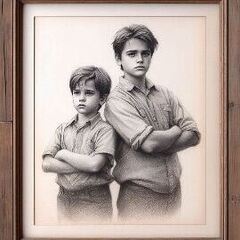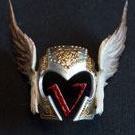Review: Center of the World
“The Center of the World” is a tessellated coming-of-age youth novel, which is about the 17 years old Phil, who has a crush on Nicholas, who’s a new classmate. Phil and his twin sister Dianne experienced a very different parenting style, practiced by their mother Glass and her friend Tereza, and their mother is well-known to be quite promiscuous in their small town—a fact that doesn’t make life easier for the siblings. Phil’s father (“Number 3”) is somewhere in America and a huge variable in his life.
Characters
Especially among the characters, there are good and bad examples: Glass is a well-made character. While the “Little People” (that’s what they call the people in their small town) consider her a bad mother, her clients see her as a tower of strength. She is extremely nonconformist and authentic, but especially because of that, lovely. Even though Phil doesn’t like Pascal, she gives him the best advice because she doesn’t mince her words and romanticize reality. Additionally, there are characters, who don’t really serve the plot and their existence is kind of strange. It almost feels like all of a sudden, a bunch of characters manifested in front of the author’s door and demanded the main role in a sub-plot and the author eventually got roped into it.
Plot
Flashbacks might be good additional plot devices; overused, they lame the plot and feel more like lavish stuffing. About half of the scenes in The Center of the World are flashbacks, and so one gets the impression that nothing really happens. The novel also has a lot of side plots with their own climaxes and plot twists, that feels crowded and make the reader lose the overview. Some things happen as a sideline without having any significant meaning to the following plot so that it wouldn’t really bother anyone if they were left out.
Themes
Glass raised her children quite laid back and anti-authoritarian, and therefore Phil doesn’t mind nudity or homosexuality. Nonetheless, love turns his head just like it happens to any other teenager. More or less, he only realized on his first date, that it is more complex than this. Especially in this point, the novel isn’t straight-line, but it doesn’t offer any solutions on the other hand. It shows that people who are attracted to each other do not necessarily feel or want the exact same thing. That particular topic would have had a huge potential, but it wasn’t used and is—contrary to the sexual orientation, the author avoided emphasizing—tabooed, especially in youth novels. A lot of novels that deal with (first) love, portray that topic as fairy-tale-like, not to say conservative in a very classic understanding of relationships that isn’t really fitting in our modern-day society. Therefore, there are only really the options “we are heads over ears in love and will be together forever” and “let’s leave that alone in the first place”. The novel also sheds light on Dianne going astray and shows, how she treats Glass and Phil, and they with her. Conflicts are hinted at, but they are more revealed step by step than solved.
End
Actually, almost every question that arose during the progression of the plot was answered. But it appears to be almost a game for the author, to ask these very questions en masse. Flashbacks bring the possibility to ask even more questions that Phil couldn’t fully understand as a child, let alone answer or just overlooked crucial details, with them. A lot of these questions don’t need to be necessarily answered to advance the plot, and therefore, it feels like the reader is sent on a scavenger hunt with never-ending mandatory side quests involuntarily. Per se, I like open endings. The author emphasizes in the postface, that the quality of the novel lies in the fact that the reader wants to continue accompanying Phil on his further journey because that’s where his self-discovery would start. If I shared that opinion, it might have been a cachet indeed, but in my opinion enough has been said not only between Phil and Nicholas but also between characters and reader. In the end, it doesn’t matter whether he meets his father or not. The focus on the father also feels like the wrong choice because there are more obvious topics. Of course, here and there, this topic is mentioned, but after Phil’s and Glass' conversation in the library, that chapter really feels closed.
Postface and sequels
The author tells us with a certain elevatedness—a trait that many of us authors that are proud of their work have—in the postface about the development of the plot—something, I would have been less likely to notice if I agreed with his opinion. He calls “The Center of the World” a 100-page-long prologue. When reading the postface, I understood some of his stratagems better—I just don’t like them any more than before. The idea of an everlasting prologue and the prompt towards the readers to imagine the story beyond what the book covers might have seemed to be a nice idea, but it just doesn’t work in my opinion. This stratagem feels like a springboard whose length was decreased to 20 % and so the best run-up in the world couldn’t give you enough momentum to cross the gap of the disillusioning plot. Furthermore, he explains to us how he was inspired by Greek mythology. Granted, a lot of Phil's childhood memories feel like fairy tales and this revelation sure was an aha moment, but ultimately it doesn’t enhance the plot. It’s an inspiration, but not more than this. In his opinion, Phil is annoying—a view I sympathize with. Not that much as a character from the reader's perspective—in my opinion, Phil is actually sympathetic—but as a character from an author’s standpoint. He is bystander of his own life. With “Defender – Geschichten aus der Mitte der Welt”, the author delivers a short story collection that should complement the novel. Without reading that sequel, I have the feeling that this might actually be a form where the author’s strengths are and maybe, it would have been wise, to publish the novel in a similar form.
Conclusion
The novel gives the impression of a potpourri of a biography (Phil has the urge to tell us about every little detail of his childhood), a novella (internal plot), and many additional short stories, that turn the novel into a compressed form or a series. Despite some lovely characters, marvelously authentic scenes, and the kindling of a gripping plot, the novel couldn’t manage to hide its unwillingness to decide on a text type. There were several wtf moments, that made me consider putting the novel aside without finishing it. With its many flashbacks, the novel appears bloated, but without them and the side plots, the novel appears to be more like warm words.
-
 2
2






0 Comments
Recommended Comments
There are no comments to display.
Create an account or sign in to comment
You need to be a member in order to leave a comment
Create an account
Sign up for a new account in our community. It's easy!
Register a new accountSign in
Already have an account? Sign in here.
Sign In Now